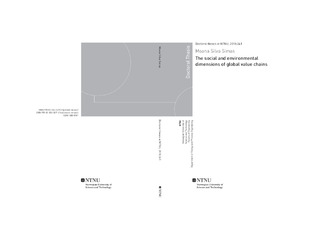The social and environmental dimensions of global value chains
Doctoral thesis
Permanent lenke
http://hdl.handle.net/11250/2583369Utgivelsesdato
2018Metadata
Vis full innførselSamlinger
Sammendrag
As the economy has become more globalized, labour and environmental impacts have been redistributed throughout the globe. Today, the complexity and fragmentation of global value chains mean that the distance between production and consumption has become longer, and consumers are often not aware of the volume or location of the upstream impacts of goods and services. Within the past decade, the use of input-output models allied to bilateral trade data have been increasingly used to assess environmental pressures embodied in traded trade. Recent developments on building harmonized time series of multi-regional input-output databases have improved the potential to do analysis of the global economy.
Here, I aim to lay out an analysis of the social and environmental dimensions of global value chains. In special, I focus on how trade and outsourcing affect labour worldwide. Low-cost labour has been one of the main factors for the increased level of outsourcing. Outsourced production comprise mainly manufacturing processes with high labour intensity and, often, stages in the production chain with high resource and energy use. While this increased labour generates positive impacts by creating jobs and generating income, especially in developing countries, it also generates undesirable social impacts and environmental externalities.
The backbone of this thesis are a set of harmonized labour accounts developed for the multiregional input-output database EXIOBASE. This dataset allowed the analysis of socioeconomic and environmental impacts and pressures brought by the fragmentation of production chains in a single framework. In this thesis, I present two articles that describe the creation of this dataset and five articles that analysed different socioeconomic and environmental aspects of global value chains.
We perform an analysis of productivity changes for labour, energy and greenhouse gas emissions when internalizing trade. We show that labour-intensive countries with lower labour costs also have lower energy and carbon productivities compared to developed economies, and show that the relocation of labour-intensive production stages to lower-income countries can lead to higher overall environmental pressures. The evolution of how labour and carbon are distributed in global value chains is further explored through an analysis over time where we show that, for developed regions, outsourcing and changes in trading partners have contributed to changes in labour and carbon footprints, while both labour and carbon footprint in developing regions were mainly driven by their own increased domestic consumption. In addition, we show how environmental footprints are strongly coupled to the countries’ affluence, and the decoupling of environmental pressures embodied in consumption from economic development present a much higher challenge that goes beyond improving domestic technology. The challenge for meeting social development while reducing global environmental pressures require multilateral efforts that combine consumers and producers in global value chains.
However, any changes in the production structure in a globalized economy, for example, driven by multilateral environmental policies such as climate agreements, can affect workers all around the world. We show that there are large volumes of labour embodied in global value chains. Furthermore, there are differences in labour conditions and composition between developing and developed regions. We quantify undesirable labour conditions associated with international trade, and show that high-income countries can double their ‘bad labour’ footprints when accounting for imports from less developed regions. The undesirable labour conditions we quantify are occupational health damage, vulnerable employment, gender inequality, incidence of unskilled and low-skilled workers, child labour, and forced labour. While any social impact of global value chains, negative or positive, driven by consumption, both consumers and producers benefit from trade. The reduction of undesirable labour conditions and improving the resilience of low-income workers in periods of economic stagnation or recession are of crucial importance for attaining the sustainable development goals of decent work. We show that low-skilled workers and workers in self-employment in the supply chain of traded goods are more vulnerable to economic downturns. During economic crisis, such as the one experienced in 2008/09, reduced consumption led to a decline in trade, which in turn resulted in loss of employment and income worldwide. However, reduced consumption in developed economies affected workers in developing economies the most.
Understanding the links between employment and income in global value chains gives us the opportunity to improve international cooperation to reduce environmental pressures in global value chains, while at the same time maintaining the economic benefits required to fulfil human needs and reduce global inequalities. This thesis aims to contribute to such efforts.
Består av
Paper A: Simas, M., K. Stadler and R. Wood. 2018b. EXIOBASE 3 - Supporting Information for labor accounts (S7). Supporting information for: Stadler, K. et al. 2018. EXIOBASE 3: Developing a time series of detailed Environmentally Extended Multi-Regional Input-Output tables. Journal of Industrial Ecology 22(3): 502-515. https://doi.org/10.1111/jiec.12715Paper B: Simas, M., K. Wiebe and R. Wood. 2018c. Mapping the structure of the global labour market: Developing fully harmonized labour accounts for MRIO analysis. - Not included in NTNU Open
Paper C: Simas, M., R. Wood, and E. Hertwich. 2015. Labor Embodied in Trade: The Role of Labor and Energy Productivity and Implications for Greenhouse Gas Emissions. Journal of Industrial Ecology 19(3): 343–356 https://doi.org/10.1111/jiec.12187
Paper D: Simas, M., E. Hertwich and R. Wood. 2018a. Drivers of employment and carbon emissions in global value chains - Not included in NTNU Open
Paper E: Simas, M., S. Pauliuk, R. Wood, E.G. Hertwich, and K. Stadler. 2017. Correlation between production and consumption-based environmental indicators: The link to affluence and the effect on ranking environmental performance of countries. Ecological Indicators 76: 317–323. https://doi.org/10.1016/j.ecolind.2017.01.026
Paper F: Simas, M., K. Wiebe and R. Wood 2018d. Jobs in global value chains: Employment and wages in European production and consumption. - Not included in NTNU Open
Paper E: Simas, M., L. Golsteijn, M. Huijbregts, R. Wood, and E. Hertwich. 2014. The “Bad Labor” Footprint: Quantifying the Social Impacts of Globalization. Sustainability 6(11): 7514–7540. https://doi.org/10.3390/su6117514 distributed under a Creative Commons Attribution License (CC BY)
